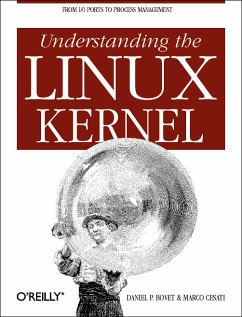Nicht lieferbar

Understanding the Linux Kernel : From I/0 Ports to process Management
Versandkostenfrei!
Nicht lieferbar
Why is Linux so efficient? Is it the right operating system for a particular application? What can be learned from looking at the kernel source code? These are the kinds of questions that Understanding the Linux Kernel takes in stride in this guided tour of the code that forms the core of all Linux operating systems.Linux is presented too often as a casual hacker experiment. It has increasingly become not only a mission-critical part of many organizations, but a sophisticated display of programming skill. It incorporates many advanced operating system concepts and has proven itself extremely r...
Why is Linux so efficient? Is it the right operating system for a particular application? What can be learned from looking at the kernel source code? These are the kinds of questions that Understanding the Linux Kernel takes in stride in this guided tour of the code that forms the core of all Linux operating systems.
Linux is presented too often as a casual hacker experiment. It has increasingly become not only a mission-critical part of many organizations, but a sophisticated display of programming skill. It incorporates many advanced operating system concepts and has proven itself extremely robust and efficient for a wide range of uses.
Understanding the Linux Kernel helps readers understand how Linux performs best and how it meets the challenge of different environments. The authors introduce each topic by explaining its importance, and show how kernel operations relate to the utilities that are familiar to Unix programmers and users.
Major topics include:
* Memory management, including file buffering, process swapping, and Direct Memory Access (DMA)
* The Virtual File System and the Second Extended File System
* Process creation and scheduling
* Signals, interrupts, and the essential interfaces to device drivers
* Timing
* Synchronization in the kernel
* Inter-Process Communication (IPC)
* Program execution
Linux is presented too often as a casual hacker experiment. It has increasingly become not only a mission-critical part of many organizations, but a sophisticated display of programming skill. It incorporates many advanced operating system concepts and has proven itself extremely robust and efficient for a wide range of uses.
Understanding the Linux Kernel helps readers understand how Linux performs best and how it meets the challenge of different environments. The authors introduce each topic by explaining its importance, and show how kernel operations relate to the utilities that are familiar to Unix programmers and users.
Major topics include:
* Memory management, including file buffering, process swapping, and Direct Memory Access (DMA)
* The Virtual File System and the Second Extended File System
* Process creation and scheduling
* Signals, interrupts, and the essential interfaces to device drivers
* Timing
* Synchronization in the kernel
* Inter-Process Communication (IPC)
* Program execution



